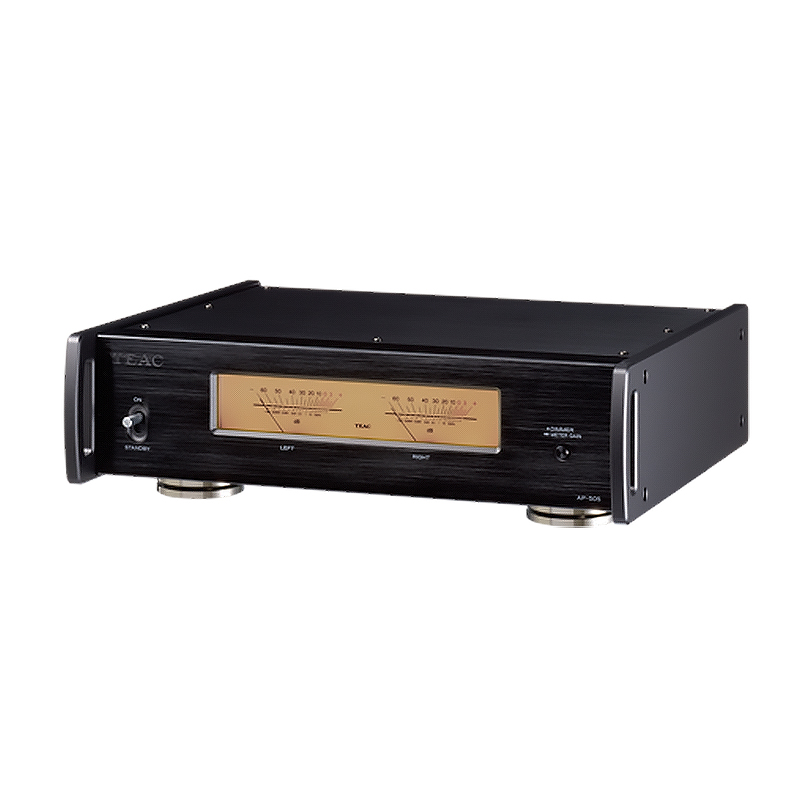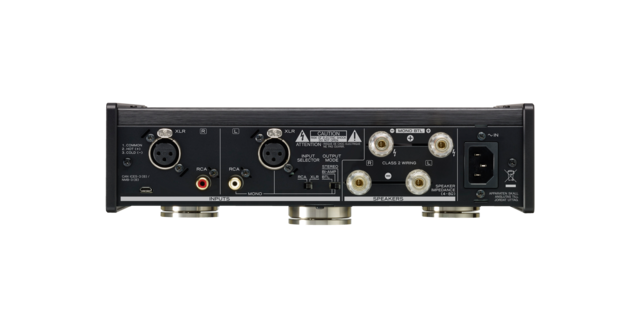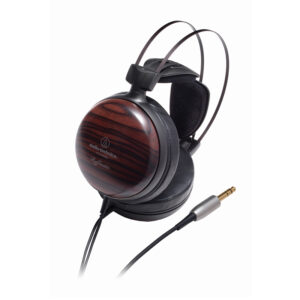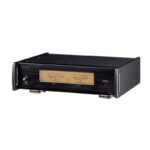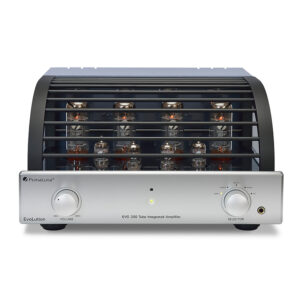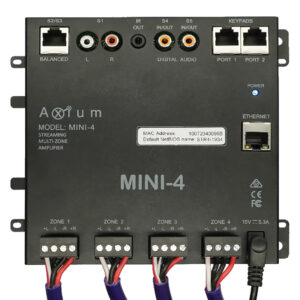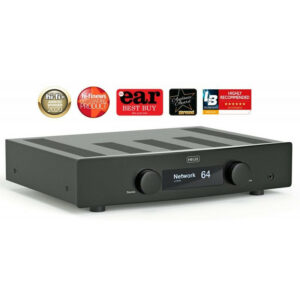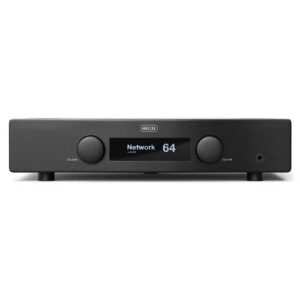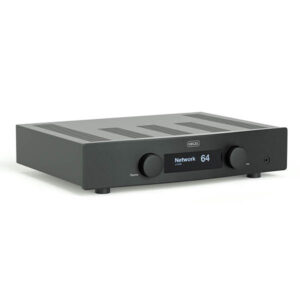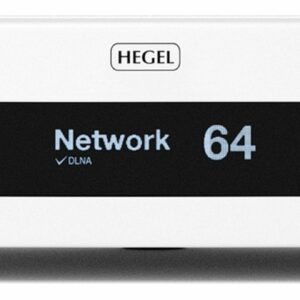Stereo Power Amplifier
An ultra-compact stereo power amplifier, powered by Hypex Ncore technology, designed to enable Bi-amping, or use in BTL (Bridge Tied Load/Bridged) mode
The AP-505 is a versatile stereo power amplifier based around a high-performance, TEAC-tuned, Hypex Ncore power amplifier module, housed within a compact and elegant case.
Capable of operating in bi-amp and BTL (Bridge Tied Load/Bridged) modes, in addition to conventional stereo operation, the AP-505 produces a maximum 115W + 115W of output power in stereo/bi-amp modes and 220W in BTL/bridged mode. At its heart is an Ncore power amplifier module, made by Hypex of the Netherlands and specially tuned by TEAC’s R&D team, for superlative sound quality
As for the exterior, lightweight aluminum-alloy panels cover a robust steel chassis. A pair of large level meters add visual interest when the amplifier is in action, while TEAC’s patent-pending ‘Pin- point’ feet, located at three strategic positions on the underside, add incision to the sound, helping to create a more detailed and stable stereo image.
Key Features
- Hypex Ncore power amplifier module, tuned by TEAC
- 115W + 115W of max output power, or 220W in BTL/bridged mode
- Can operate in Stereo, Bi-Amp and BTL/bridged modes
- Fully balanced circuit design
- Carefully selected high-quality components, exclusively designed for Hi-Fi applications
- Large toroidal power transformer and Schottky barrier diodes
- Comprehensive protection circuits (Surge, Over-voltage, Thermal)
- Patent-pending ‘Pin-point’ feet for easy installation (Japan Patent No.4075477, No.3778108)
- Large level meters
- Passive-cooling for silent operation
- A4-sized footprint and full-metal body for rigidity, stability and elegance
- XLR Balanced and RCA Unbalanced analog audio inputs (one set of each)
- Wide-pitch, screw-type speaker terminals
- Auto power-saving
- RoHS compliant
Dual analog level meters signal musical momentum
Analog level meters on the front panel move in response to signal levels, giving a visually pleasing confirmation that the amplifier is doing its job. A four-step dimmer (bright, mid, dim off) allows users to adjust the intensity of display to their taste, while a switchable sensitivity (±0dB, +20dB, movement off) allows you to enjoy more, less, or even no meter movement, if preferred.
Naturally, even if the backlight is off and meter movement has been disabled, you are still able to tell the unit is on… by checking the position of power switch!
Passive-cooling design for silent operation
It makes no sense to design an amplifier that delivers excellent sound to a pair of speakers but which itself generates distracting operating noise from a cooling fan. From the outset our engineers were determined to use a circuit and layout that would allow sufficient natural cooling, one that would allow the creation of a compact but powerful amplifier which didn’t need the help of a cooling fan.
‘Pin-Point’ feet for easy installation
The AP-505 employs TEAC’s patent-pending ‘Pin-Point’ feet. These comprise two separated metal sections in an integrated housing. One has a spiked top and is attached to the bottom of the chassis, the other is a basin-shaped base that hangs down from the spiked section, with a flange-shaped cup to simplify installation. As a result of the unique design, the ‘Pin-Point’ feet considerably minimize vibrations and resonance, by virtue of the fact that the unit is supported on just three points, with a very small surface contact area. This arrangement reduces mid and low frequency muddiness so improving the soundstage and enhancing fine sonic detail.
An oversized toroidal power transformer
In the power supply, the AP-505 employs a high capacity toroidal-core transformer, with Schottky barrier diodes in the rectifying circuit. Unlike conventional diodes, Schottky barrier diodes reduce rectifier noise, leading to a ‘cleaner’ supply and a more stable delivery of current.
Carefully selected components, exclusively designed for hi-fi applications
At the input stage, where sound quality is fundamentally defined, high-quality MUSES8820E dual op- amps are employed for both the XLR and RCA inputs. In the power supply section for the input stage, both the left and right channel rectifying circuits are completely independent from the power transformer onwards, and employ four, high-capacity, 4700μF capacitors on each channel (8 in total), achieving clear soundstage separation between channels.
At the XLR input section, a well-designed circuit delivers excellent signal integrity, thanks in part to the elimination of coupling capacitors that can often lose audio information as a signal travels through them.
Fully-balanced design
By employing a fully-balanced circuit design from the input section to the output stage, the AP-505 keeps the audio signal as unadulterated as possible as it moves through the amplifier, the result being extremely low distortion levels and an excellent signal-to-noise ratio (assisted by the effective elimination of common-mode noise).
Full-metal, small footprint body for rigidity, stability and elegance
Every external panel – at the front, top and sides – is formed from high-grade aluminium alloy, firmly attached to the robust steel inner chassis. This method of construction helps reduce the transmission of mechanical vibration, ensuring that every single element inside the unit is allowed to perform at its best. Thanks to its convenient A4-sized footprint, the AP-505 easily slots into modern interiors where space-efficiency is important, such as on a desktop. This is in stark contrast to most conventional bi- amp/BTL-capable power amplifiers which are usually bulky, full-width units.
Latest Hypex Ncore amplifier technology, tuned by TEAC
The AP-505 employs a high-performance, energy-efficient Hypex Ncore power amplifier module which produces 115W + 115W in stereo/bi-amp modes or 220W in BTL mode. The module, which has undergone extensive listening tests before being carefully tuned and tweaked by our engineers, easily drives a wide range of speakers, delivering anything from a pianissimo to a fortissimo, and everything in between. In other words, it properly reproduces the dynamics of real music.



